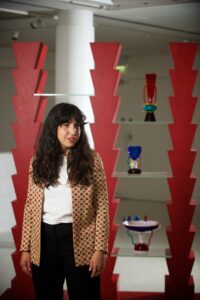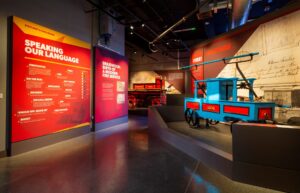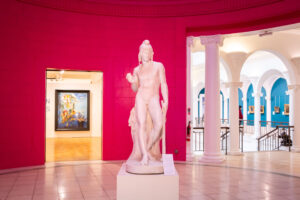Focus On: Diversity
Each month we’re taking a look at one of the ten priority areas of the strategy for Scotland’s museums and galleries.
This edition highlights the importance of diversity in the museum sector workforce. This diversity includes characteristics such as gender, sexuality, race, religion, socio-economic status, disability, and more.
You can use the advice and information below to help encourage diversity at your museum or gallery.

What is the diversity priority area?
Scotland’s museums and galleries will diversify the workforce (including trustees, staff, and volunteers) seeking to prioritise those who have been previously underrepresented.
You can read the diversity priority area and actions in full on our strategy hub.
Find out how your museum or gallery can achieve the diversity aims of the strategy by exploring the resources on this page.
Our 2022 survey for Scotland’s museums and galleries revealed that only 37% of respondents collected information about the demographic characteristics of their staff.
Collecting demographic data about your workforce can provide insights into under-represented groups, inform ambitions and targets for addressing this, and help monitor the impact of diversity initiatives.
It’s important to be clear why you are asking staff to disclose information and how you will use it. PurpleSpace’s Five Trust Tests document offers useful advice on collecting workforce data. Although the Five Trust Tests focus on disability and long-term health conditions, they can apply to a range of data you may be looking to collect.

Diversity resources
Diversity case studies
These case studies highlight a range of projects that have improved the diversity of the museum sector workforce and raised awareness of museum sector career options.
Workforce and Recruitment advice topic
Resources for staff, volunteers, and trustees at museums and galleries. This includes guidance on implementing Fair Work practices at your organisation.
Marseum learning resource
Your mission: to make a museum on Mars! We’ve worked with Daydream Believers to create an exciting free learning resource which will inspire school pupils to discover the diversity of work in the museum sector.
Modern Apprenticeships
Modern Apprenticeships can be a great way to diversify your workforce and bring new ideas to your museum or gallery. Apprentices fulfil a job role while learning new skills and earning a qualification.
Diversifying the workforce
This MGS advice guide contains resources that look at inclusive recruitment, training, and programmes for diversifying the museum and gallery workforce, including integrating anti-racist practice within this.
Inclusive volunteering toolkit
Find out how to improve the inclusivity of your volunteering programmes with this new toolkit by Make Your Mark.
Equitable recruitment practices
Museums can develop more equitable recruitment practices by following this guidance from Curating for Change.
Measuring socio-economic diversity
The Social Mobility Commission has created a toolkit to help you measure the socio-economic diversity of your organisation.
Delivering Change: Museum Transformers
This is an anti-oppression programme that aims to empower the museum workforce to make changes to help all people to access culture.
It will support participating museums and galleries to develop organisational cultures that are based on anti-oppression principles, making them more inclusive and enabling them to welcome more diverse workers, volunteers, and audiences.
Be part of the change! We’re looking for museums to join the Museum Transformers programme. Find out more by visiting the Delivering Change project page.

Diversity at your museum or gallery
Maximise the impact of your diversity work by considering these questions below.
Find out how to implement effective voice at your museum or gallery by reading our Fair Work: Effective Voice guide.
Are there any assumptions or restrictions in place which disproportionately impact certain groups of staff? Access to opportunities should be considered in your organisation’s succession planning.
Organisations can support the needs of workers with visible and invisible disabilities by providing all staff with reasonable adjustment passports (RAPs). The Lancaster University website explains RAPs and offers a downloadable template.
MGS funding
The diversity aims of Scotland’s museums and galleries strategy are reflected in our grants outcomes and expectations.
Funding applications must address one or more of our grants outcomes depending on the requirements of the fund. Your projects may include commitments to improving representation within your workforce and removing barriers to access.
Visit our funding section to read our grants outcomes and expectations in full.

Our diversity journey at MGS
MGS is a values-based organisation with recruitment practices which are designed to be inclusive and transparent.
We recently updated our job application process to more proactively offer the option of alternative application formats. All job descriptions include a person specification that values skills gained across a wide range of experiences, and we collect and analyse anonymous (voluntary) equalities data from job applicants, current staff, and Board members.
We’ve hosted Modern Apprenticeships, currently have two Foundation Apprentices working with us, and have worked for a number of years with partners such as Career Ready.
We continue to work to integrate change within our own organisation and learn from others. This process of learning and integration will be an important element of our Delivering Change programme.
We have aspirations to broaden the ways we share information for prospective job applicants and plan to roll out reasonable adjustment passports. We regularly discuss our practice as a team and value ideas from all staff.
We talk more about our own approach to workforce diversity and inclusion across various sections of our website including Working with us, our Commitment to Anti-Racism, and our series of blogs around Fair Work.
More resources on workforce diversity can be found in our Diversifying the Workforce advice guide.
Find out more
Working to achieve the diversity aims of Scotland’s museums and galleries strategy might also lead to progress on areas such as Fair Work, inclusion, and skills & confidence.
Our next edition will take a look at the place priority area of the strategy. If you have any resources, case studies, or questions relating to the health and wellbeing or diversity priority areas, please get in touch.